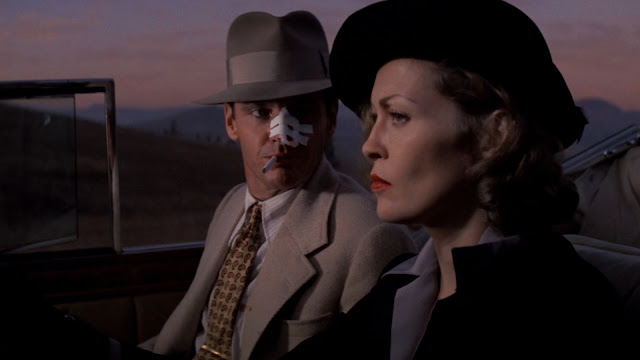Chinatown
It's a rare film - one that you want to dismantle into a million pieces to examine its beautiful ticking parts. Each comprised of the finest quality. And yet the sum, as they often say, is greater than its parts. It is a film to watch over and over and to savor. Not just to peel back layers and discover something new, but to re-examine the surfaces and find they were indeed quite deep to start with. A movie where everything is just perfect. Many have used that word to describe 1974's CHINATOWN, and every bit of ink spilled over it to that end is entirely warranted. Perfect.
It doesn't happen often. Many of the films I would consider great have at least one flaw, even a wince worthy element in an otherwise stellar presentation. I think of the unfortunate narration in LITTLE CHILDREN. Quentin Tarantino's cameo in PULP FICTION. Some have a bad score, or an odd choice of tone. Maybe even a weak script that is nonetheless overcome by the actors and director.
CHINATOWN does not have a weak script. Robert Towne's work in fact is often cited as the screenplay to which all others should be measured. That word "perfect" is used to describe it. What is the standard of measure here? Syd Mead? Why is the blueprint for this landmark film "perfect"? Because it plays within the rules of film noir, the genre of years before that CHINATOWN emulates?
I believe it is perfect because in addition to its golden blueprint, it looks and feels right. John A. Alonzo's photography is sharp in L.A. sunlight as to almost X-ray the deception under every fascade. And it captures 1930s architecture and props in a very organic fashion. Nothing is out of place. The movie is also perfect for its exchanges between low rent private eye Jake Gittes (Jack Nicholson) and recent widow Evelyn Mulwray (Faye Dunaway), dialogue that crackles with life and valuable info (if you're paying close attention). Staccato retorts are common among all of the wonderful players in CHINATOWN. It all plays like the sort of classic noir to which the film aspires, and possibly even surpasses.
The story line is complex. It involves crooked plots within the Los Angeles Department of Water and Power to acquire land cheaply for later profitable development, all by depriving that land of irrigation. The story is inspired by turn of the century battles between L.A. and the Eastern Valleys in which aqueducts were constructed to feed the burgeoning city, while the outlying areas starved.
But CHINATOWN is a also a psychological play, with lurid family secrets to be revealed that are as important as any other plot detail. How does Evelyn's father, the malevolent tycoon Noah Cross (John Huston), figure into the nefarious plot, the familial tragedy? Quite significantly, left for you to discover. Both elements are woven beautifully by Towne and director Roman Polanski, whose work here is so amazing, never flashy, and so hard to articulate in a summary. I find that some of my favorite films are difficult to review because they touch me in ways that I don't even fully comprehend. There's so much to say about the movie, but it's as if words just can't quite get it across.
The final line in the movie, "Forget it, Jake. It's Chinatown," refers to the hopeless jurisdictional woes the LAPD face when dealing with that Asian population, but also the complexity of human behavior, rarely to follow anything resembling logic. That sort of conundrum may also (in a good way) relate to my difficulty in expressing my admiration for what I consider to be one of the greatest films ever made.
Director David Fincher, a contemporary cinematic master, shares a commentary with Towne on the CHINATOWN Blu-ray. His enthusiasm is never hidden. I enjoyed one of his analyses, something to do with a repeated motif of duality, represented by pairs of objects. Towne says he has no recollection of any m.o. to that end. Art transcends the artist, yet again.


Comments